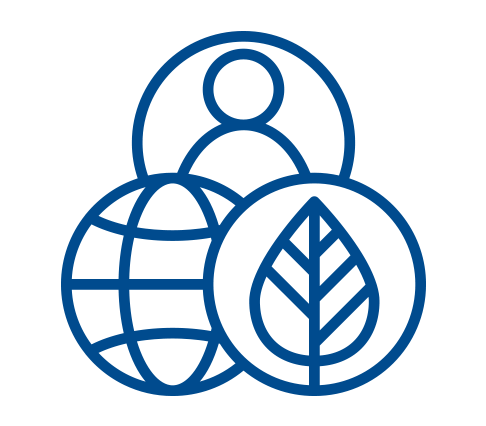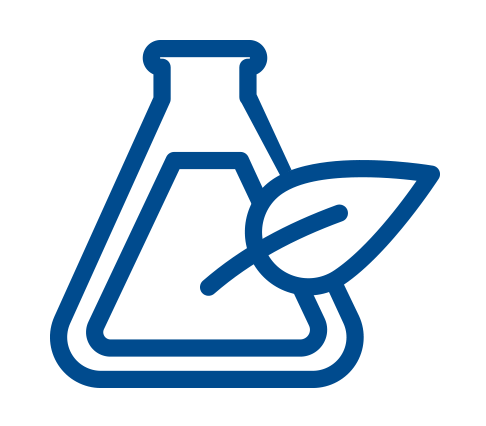
Creating change
Being active, taking responsibility and exchanging experience and knowledge is important in order to create a world where sustainable living, working and doing research plays an increasing role in everybody’s life. The German Council for Sustainable Development defines universities as pioneers for change processes. That is why the topic has been addressed in this year's international Alumni DAAD project 'Creating change - sustainable thinking, working and doing research'.
Which aspect of sustainable life, work and research is especially relevant for you and why?

In developing countries and particularly in Yemen, a large segment of the population still relies on folk medicine to treat serious diseases, especially in rural areas. However, there is a lack of documentation and information concerning the chemical characterization, potential health benefits, safety and toxicity of medicinal plants […]. My research is providing new knowledge on the health benefits of selected Yemeni herbal plants as a folk remedy and searching for new effective natural products […] to be used as health supplements or nutraceuticals.
Dr. Ghanya Al-Naqeb
Research fellow at Agriculture, Food andEnvironment Center, Italy

[…] Today, it is important for me and many scientists in Armenia to be integrated into the international scientific community via traveling to conferences, exchange programs for scientists, and knowledge and skills exchange. Knowledge accessibility is also a big concern, since there is a problem with subscriptions to most scientific journals etc. I believe that productive science management, development of strategic scientific branches, global collaborative networking and enthusiasm of scientists can guarantee the stable development of science in Armenia.
Dr. Nelly Babayan
Head of the Laboratory of Cell Technologies, Armenia

Currently, Ghana is suffering from the double burden of malnutrition. While parts of the population are undernourished, others suffer from overweight, obesity or diet-related chronic diseases. We need to increase the availability and consumption of local foods, and promote […] physical exercise. My current area of research, which focuses on locally available underutilized legumes, will help augment the effort aimed at alleviatingthis.
Guy Eshun
Acting Head of the Department of Food and Nutrition Education, Ghana

Present-day academia, especially in the natural sciences, is poorly organized and badly managed. Scientists are judged by their ability to obtain large research grants and publish in so-called high-impact journals. […] This demoralizes a large fraction of researchers who are otherwise perfectly capable of making valuable contributions to the production of knowledge. The true quality of scientific research […] has lost prestige. Academia [should] provide an encouraging and level playing field conducive to thoughtful, quality research that is both satisfying and sustainable.
Prof. Dr. Raghavendra Gadagkar
Professor at CES, Indian Institute of Science, India

The Sahel Zone (known as dry land) is facing a paradox of inundation marked by high and intensive rainfall in a short time and soil erosion that can cause irreversible geomorphological and ecological modifications, which could have positive or/and negative impacts. It is important to understand how new processes are happening. Geo-micromorphological investigations can help to find out how to manage land degradation and how to plan and implement research-development programs related to our adaptation and resilience to the consequences of climate change in the Sahel zone.
Dr. Sani Ibrahim
Teacher of geomorphology and applied hydrology, Niger

Reducing the impact of climate change via adequate mitigation and adaptation options and via the use of earth observation data are crucial for improving our livelihood.
Dr. Benewindé Jean-Bosco Zoungrana
Senior Lecturer and researcher of climate change, Burkina Faso

[…] Minimizing diseases in aquaculture is very important to sustainably produce seafood without using antimicrobials, thus minimizing health risks due to the presence of antimicrobial residues and antimicrobial resistance in aquaculture. Good aquaculture practices are needed to ensure safety of its products […]. Achieving a sustainable increase in aquaculture production would lead to increased food availability and food safety, thus contributing to less hunger and good health and wellbeing as well as promoting responsible production and consumption.
Dr. Iddya Karunasagar
Research Advisor and international consultant in food safety, India

As an educator, I consider an “applicable” learning process worthwhile. This kind of learning considers the context of the learning environment. […] As a religious teacher, I am engaged in the kind of religious education that is aimed at producing religious leaders who have the goal of sanitization of the political sphere in the country at heart. This is important in a religiously charged environment where corruption is endemic and religious violence is an everyday reality.
Rowland Onyenali
Senior lecturer in biblical theology and biblical languages, Nigeria

Social-ecological imbalances are not rooted in nature, but in human-environmental interactions. I believe that it is crucial to find ways, through work and research, to improve how we live with our natural environment and incorporate nature into all spheres of human life.
Fidelcastor Kimario
Senior community-based conservation Officer in the Wildlife Department at the Ministry of Natural Resources and Tourism, Tanzania

Relationships with oneself, God, other humans, animals, environment etc. are a few of the many dimensions of our dependent existence. Dialogue between those is the inevitable tool or modus operandi for relationships. It will enlighten our minds and lead the world to an integral spiritual, political, economic, educational and ecological renaissance. India has eight religions, which play a big role in sustainable life. Religious leaders are influential in the society and they take initiative for the integral renaissance. We promote dialogue between religions.
Dr. Prasad Theruvathu
Theologist, India
What would be your wish for the future regarding sustainable living, working and doing research?

In a country in which war can start every second, I wish for peace. I wish the people would have the opportunity to work and develop their countries in a stable environment. I wish to make my country a participant in and a part of worldwide technical progress and help to grow a generation of inventors, not mindless consumers. I wish for science without borders and education available for everyone in the world.
Dr. Nelly Babayan
Head of the Laboratory of Cell Technologies, Armenia

My wish forthe future is to see a society where there is equality, justice, and security for all; where research, knowledge transfer, and the advisory system significantly support the voices of the disadvantaged not only being heard but recognized, accepted, and adequately rewarded; where all farmers have equal access, control, and decision-making power to produce, process, and provide food and resources for themselves, their families, households, and communities; where rural boys and girls have access to quality education and enjoy security. […]
Prof. Dr. Olanike Deji
Professor of Agricultural Extension and Rural Sociology, Nigeria

I wish for food security for all. This potentially may lead to a reduction in deficiencies, excesses or imbalances in nutrients consumption and help inreducing diet related health conditions. The outcome of my ongoing research might lead to the increase in the cultivation (by farmers) and usage (by the general population) of underutilized legumes. This would also result in an improvement in the farmers’ finances, thus reducing poverty. The Government can create a market for farmers who cultivate these legumes.
Guy Eshun
Acting Head of the Department of Food and Nutrition Education, Ghana

It is my hope that we can bring about major reforms in academia and value the quality of research rather than mere quantity and evaluate scientists by their contribution to significant new knowledge irrespective of their fund-raising ability and where their research is published. Going a step further, we would do well to tilt the balance and add prestige to low-cost research. We need to create and embrace diversities of many kinds including gender, race and ethnicity, disciplines of research and their underlying philosophies, research methodologies, uses of knowledge...
Prof. Dr. Raghavendra Gadagkar
Professor at CES, Indian Institute of Science, India

I am convinced that sustainability is not an option or a choice, it is a mandatory path we have to take if we want to live in a peaceful, healthy and prosperous world. […] Covid-19 gave us a taste of the difficulties of changing habits and practices. But the effects were not the same in different parts of the world and vaccines are also not being equally distributed, making it even more difficult for poor regions to regain traction in their economic cycles. The good news is that science and knowledge can get us through these hard times and I wish that in the future, economy and sustainable practices will come hand-in-hand with lower global inequalities,enhance productivity worldwide and transform the world into a safer and healthier place to live.
Dr. Luiz Eduardo Garcia da Silva
Currently researching the feasibility of a currency union adoption in South America, Brazil

I genuinely hope for an end to social inequality, wealth disparity, and the waste of human life that social inequality and wealth disparity encourage and celebrate within global capitalism. I work primarily at universities in the United States, a country where it is possible to see amazing advancements and inventions of the human mind one day, and people dying medieval deaths the next. There is a similar paradox happening across the world, and, as our leaders at the United Nations and elsewhere point out, we can certainly continue our scientific and technological advancements, but we must stop the violent loss of human life.
Prof. Dr. Nigel Hatton
Associate Professor of Literature and Philosophy, USA

The events related to climate change will affect the sustainability of global food production systems and food safety. In the fishery sector, the global demand for fish would increase phenomenally, but water resources are limited. Factors related to climate change such as an increase in sea surface temperature, ocean acidification and algal blooms could lead to conditions that would affect fish health and increase the need for therapeutic options that do not lead to antimicrobial resistance. However, innovative technologies involving artificial intelligence could help improve the sustainability of food systems.
Dr. Iddya Karunasagar
International consultant in food safety, India

My wish appears very simple. It is for the younger generation to have a rational approach to religion. This rational approach would lead to a positive engagement among the different religions in the country and the world at large. A situation where religious texts and creeds are not critically evaluated leads to avoidable tensions and a loss of regardfor human dignity. In practice, my wish is complicated. This is because governments do not pay attention to education as much as they do to politics.
Rowland Onyenali
Senior Lecturer in biblical theology and biblical languages, Nigeria

One Syrian woman who is currently living in Germany once told me: ‘There is no future without a past’. People’s life-narratives need to be documented for future generations to learn from. These narratives can be presented in various academic, but also artistic ways such as through expressionist art, Augmented Reality and Virtual Reality.
Dr. Yafa Shanneik
Lecturer in Islamic Studies, England

Knowledge production is a global matter since what any of us produce is public and can be used by anybody all over the world through the internet. What I would wish thus is that, as the design of diagnostic, epidemiological, preventive and therapeutic tools, essential in the optimization of the health systems responsible for the control of neglected diseases require research in health sciences, the outcome of this production of knowledge should be made readily available to those that need to solve health problems that symbolize the focal needs associated with neglected diseases. […]
Prof. Dr. Alicia Ponte-Sucre
Professor and Head of the Laboratory of Molecular Physiology, Venezuela
Images: Getty Images